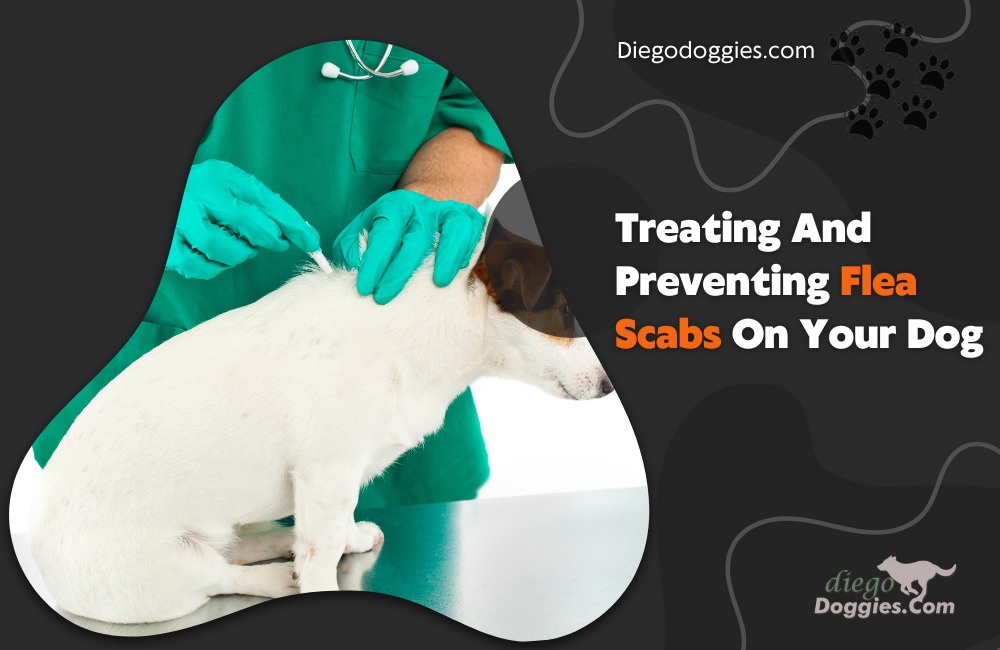Fleas are small, dark-colored insects that thrive in warm, humid environments. Although they are often associated with dogs, fleas can also infect cats, rabbits, and even humans. Fleas are more than just a nuisance – they can transmit diseases and cause severe skin irritation. In fact, flea bites are the most common cause of allergic reactions in pets.
While fleas do not typically pose a serious threat to human health, they can cause discomfort and may even transmit diseases to humans. Therefore, it is important to take measures to prevent flea infestations and to treat them quickly if they do occur.
If you notice scabs on your dog, it is important to take action to treat the problem. Scabs can be a sign of a flea infestation, and if not treated properly, they can become infected.
1. What Are Flea Scabs?
Flea scabs are a skin condition caused by flea bites. They usually appear as small, red bumps on your dog’s skin. In severe cases, flea scabs can cover the entire body and may be accompanied by hair loss.

2. What Are The Signs Of A Flea Infestation?
If you notice scabs on your dog, it is important to check for other signs of flea infestation. These include:
- Excessive scratching or biting at the skin
- Hot spots (red, inflamed areas of skin)
- Hair loss
- Flea dirt (black specks that look like dirt but are flea feces)
3. How Do Fleas Cause Scabs?
Fleas cause scabs by biting your dog and injecting their saliva into the skin. This saliva is full of proteins that can cause an allergic reaction in some dogs. The resulting itchiness leads to scratching and biting, which can then lead to scabbing.
4. How Can I Treat Flea Scabs?
If you notice flea scabs on your dog, it is important to take action to treat the problem. The first step is to treat your dog for fleas. This can be done with a topical spot-on treatment, oral medication, or by bathing your dog with a flea shampoo. A trip to your local vert is recommended.
Once the fleas are gone, you can start treating the scabs. This can be done with a medicated shampoo or cream. Your vet may also need to give your dog an antibiotic if the scabs are infected.
5. How Can I Prevent Flea Scabs?
The best way to prevent flea scabs is to prevent fleas from infesting your home in the first place. This can be done by using a monthly topical spot-on treatment or oral medication. You should also vacuum regularly and wash your dogs.

6. Can Flea Scabs Become Seriously Infected?
If not treated properly, flea scabs can become infected. This usually happens when your dog scratches or bites at the scabs, causing them to bleed. Infected scabs can be painful and may ooze pus.
7. How Do I Know If My Dog Has An Infection?
There are several signs that your dog may have an infection, including:
- Redness
- Swelling
- Pus or discharge
- Fever
- Loss of appetite
- lethargy
If you notice any of these signs, take your dog to the vet for treatment.
8. Treating An Infected Flea Scab
If your dog has an infected flea scab, it is important to seek veterinary treatment. This usually involves antibiotics and may require hospitalization.
In severe cases, infected flea scabs can lead to sepsis, which is a potentially life-threatening condition. If you think your dog may have sepsis, take your dog to the emergency vet immediately.
9. Are Dog Fleas Disease Carriers For Humans?
Although dog fleas are not able to survive on humans for long, they can still bite us and cause an infection. These infections are usually nothing serious, but in some cases, they can be dangerous. For example, flea bites can cause a bacterial skin infection called cellulitis. In rare cases, cellulitis can lead to sepsis, which is a potentially life-threatening condition.
Fleas can also transmit bartonellosis, a disease that can cause fevers, headaches, and vomiting in humans. Fortunately, bartonellosis is rare and is usually only transmitted to humans if they are bitten by an infected flea. However, it is still important to be aware of the risks posed by dog fleas and to take steps to prevent them from biting you or your family members.
Conclusion
Flea scabs can be a nuisance for you and your dog. But with proper treatment and prevention, they do not have to be a serious problem. If you think your dog has flea scabs, talk to your vet about the best way to treat them. They will also be able to recommend chemical treatment or natural herbal treatment to prevent flea infestation.
Related Contents
- 12 Swimming Safety Tips for Your Dog
- 14 Ways to Help Keep Your Dog Happy and Healthy
- 5 Reasons Why Your Dog Needs a Dog Life Jacket
- A Step-By-Step Guide To Removing A Tick From Your Dog
- Collars Versus Harnesses for French Bulldogs
- Cutting a Dog’s Nails: How to Prevent Bleeding
- Dachshund Health Problems and How to Prevent Them
- Dog Pregnancy Guide: Signs, Care And Preparation
- Dog Teeth Cleaning in San Diego: The Pros and Cons
- Flea Control for Dogs: Chemical Products vs Natural Remedies
- Flea Treatment for Dogs- What Is the Best Flea Treatment For Dogs


1 thought on “Treating And Preventing Flea Scabs On Your Dog”